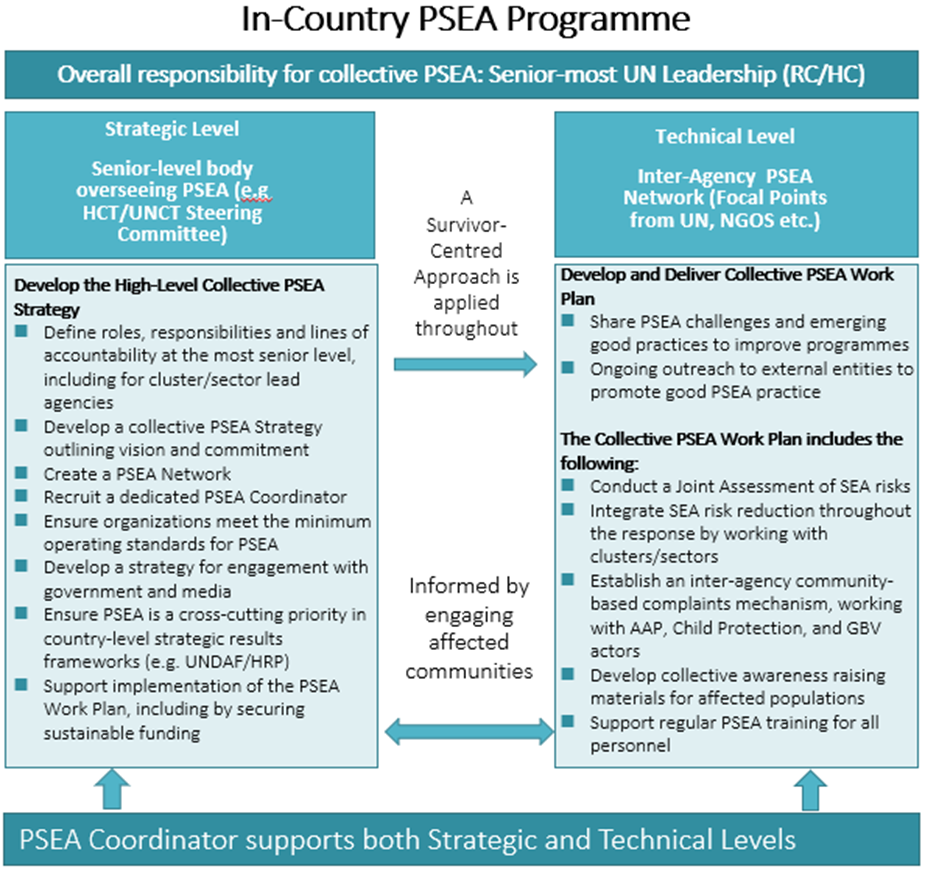In addition to the overarching commitment to AAP, IASC Principals and humanitarian actors overall are also committed to zero tolerance for, sexual exploitation and abuse (SEA) within all humanitarian work environments.
Sexual exploitation and abuse of affected community members by anyone associated with the provision of aid is a significant protection issue. It is also one of the most serious breaches of humanitarian accountability.
The IASC six core principles relating to sexual exploitation and abuse state that:
- Sexual exploitation and abuse by humanitarian workers constitute acts of gross misconduct and are therefore grounds for termination of employment.
- Sexual activity with children (persons under the age of 18) is prohibited regardless of the age of majority or age of consent locally. Mistaken belief regarding the age of a child is not a defence.
- Exchange of money, employment, goods, or services for sex, including sexual favours or other forms of humiliating, degrading or exploitative behaviour, is prohibited. This includes exchange of assistance that is due to beneficiaries.
- Any sexual relationship between those providing humanitarian assistance and protection and a person benefiting from such humanitarian assistance and protection that involves improper use of rank or position is prohibited. Such relationships undermine the credibility and integrity of humanitarian aid work.
- Where a humanitarian worker develops concerns or suspicions regarding sexual abuse or exploitation by a fellow worker, whether in the same agency or not, he or she must report such concerns via established agency reporting mechanisms.
- Humanitarian workers are obliged to create and maintain an environment that prevents sexual exploitation and abuse and promotes the implementation of their code of conduct. Managers at all levels have particular responsibilities to support and develop systems that maintain this environment.
Countries with an activated cluster system should have a PSEA structure in place (see diagram below). This includes an inter-agency PSEA Network, a PSEA Coordinator and a PSEA Programme – guided by a PSEA Strategy and implemented under an action plan.

Diagram Adapted from the UN Resident and Humanitarian Coordinator Handbook (IASC, 2021), p. 101.
“What is the FSC Coordinator’s role?” Upholding and promoting policies and procedures to prevent and respond to sexual exploitation and abuse is critical in all FSC operations. The FSC Coordinator has a key role to play by using the FSC platform to raise awareness of PSEA commitments, codes of conduct and related reporting mechanisms among members. He/she should encourage FSC members to put in place appropriate mechanisms to prevent and respond to sexual exploitation and abuse.
Please refer to the examples of FSC Coordinator activities included under the AAP point above.
Guidance:
- AAP & PSEA Tip Sheet (gFSC Protection Taskforce group /PQWG, 2022)
- IASC Plan for Accelerating PSEA in Humanitarian Response at Country Level (2019)
- IASC Principals' Statement on Protection Against Sexual Exploitation and Abuse (2015)
- Suggested actions for cluster coordination groups to strengthen accountability to affected populations and protection in the Humanitarian Programme Cycle (IASC, Global Protection Cluster, OCHA, 2016)
- Guidance Note on Reflecting Protection from Sexual Exploitation and Abuse (PSEA) in Humanitarian Response Plans (HRPs) (OCHA, 2020)
For further information see also: